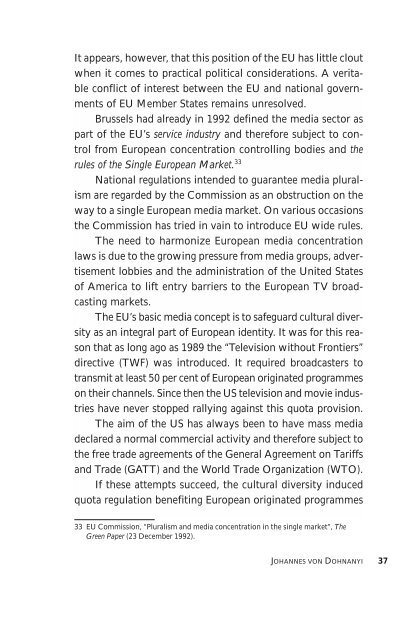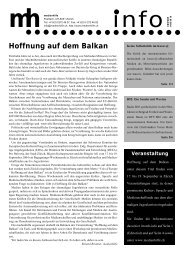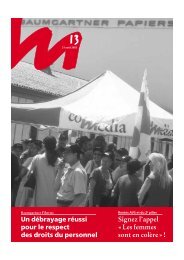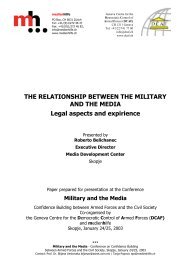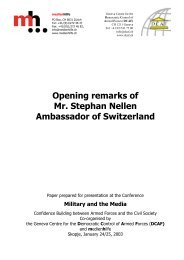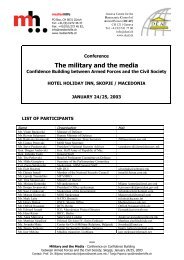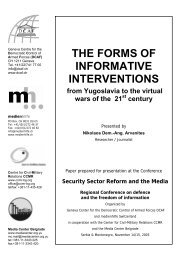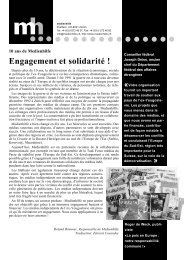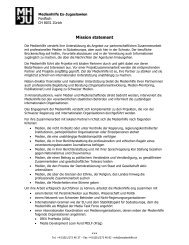The Impact of Media Concentration on Professional ... - OSCE
The Impact of Media Concentration on Professional ... - OSCE
The Impact of Media Concentration on Professional ... - OSCE
You also want an ePaper? Increase the reach of your titles
YUMPU automatically turns print PDFs into web optimized ePapers that Google loves.
It appears, however, that this positi<strong>on</strong> <str<strong>on</strong>g>of</str<strong>on</strong>g> the EU has little cloutwhen it comes to practical political c<strong>on</strong>siderati<strong>on</strong>s. A veritablec<strong>on</strong>flict <str<strong>on</strong>g>of</str<strong>on</strong>g> interest between the EU and nati<strong>on</strong>al governments<str<strong>on</strong>g>of</str<strong>on</strong>g> EU Member States remains unresolved.Brussels had already in 1992 defined the media sector aspart <str<strong>on</strong>g>of</str<strong>on</strong>g> the EU’s service industry and therefore subject to c<strong>on</strong>trolfrom European c<strong>on</strong>centrati<strong>on</strong> c<strong>on</strong>trolling bodies and therules <str<strong>on</strong>g>of</str<strong>on</strong>g> the Single European Market. 33Nati<strong>on</strong>al regulati<strong>on</strong>s intended to guarantee media pluralismare regarded by the Commissi<strong>on</strong> as an obstructi<strong>on</strong> <strong>on</strong> theway to a single European media market. On various occasi<strong>on</strong>sthe Commissi<strong>on</strong> has tried in vain to introduce EU wide rules.<str<strong>on</strong>g>The</str<strong>on</strong>g> need to harm<strong>on</strong>ize European media c<strong>on</strong>centrati<strong>on</strong>laws is due to the growing pressure from media groups, advertisementlobbies and the administrati<strong>on</strong> <str<strong>on</strong>g>of</str<strong>on</strong>g> the United States<str<strong>on</strong>g>of</str<strong>on</strong>g> America to lift entry barriers to the European TV broadcastingmarkets.<str<strong>on</strong>g>The</str<strong>on</strong>g> EU’s basic media c<strong>on</strong>cept is to safeguard cultural diversityas an integral part <str<strong>on</strong>g>of</str<strong>on</strong>g> European identity. It was for this reas<strong>on</strong>that as l<strong>on</strong>g ago as 1989 the “Televisi<strong>on</strong> without Fr<strong>on</strong>tiers”directive (TWF) was introduced. It required broadcasters totransmit at least 50 per cent <str<strong>on</strong>g>of</str<strong>on</strong>g> European originated programmes<strong>on</strong> their channels. Since then the US televisi<strong>on</strong> and movie industrieshave never stopped rallying against this quota provisi<strong>on</strong>.<str<strong>on</strong>g>The</str<strong>on</strong>g> aim <str<strong>on</strong>g>of</str<strong>on</strong>g> the US has always been to have mass mediadeclared a normal commercial activity and therefore subject tothe free trade agreements <str<strong>on</strong>g>of</str<strong>on</strong>g> the General Agreement <strong>on</strong> Tariffsand Trade (GATT) and the World Trade Organizati<strong>on</strong> (WTO).If these attempts succeed, the cultural diversity inducedquota regulati<strong>on</strong> benefiting European originated programmes33 EU Commissi<strong>on</strong>, “Pluralism and media c<strong>on</strong>centrati<strong>on</strong> in the single market”, <str<strong>on</strong>g>The</str<strong>on</strong>g>Green Paper (23 December 1992).JOHANNES VON DOHNANYI 37


